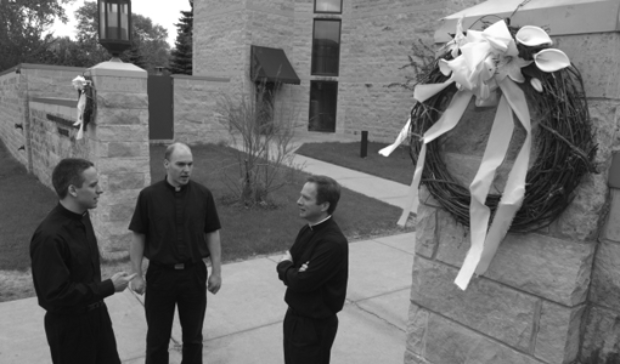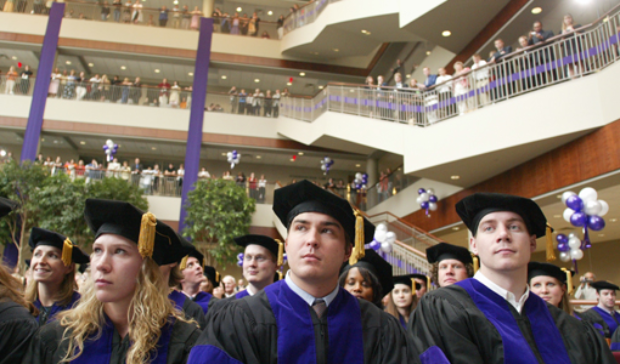What did the death of Pope John Paul II and the election of Pope Benedict XVI mean to St. Thomas and to the Catholic Church?
Because the university has two seminaries – the college-level St. John Vianney Seminary and the graduate-level St. Paul Seminary School of Divinity – and the largest Catholic Studies program in the United States, opinions on these events are discerning.
“Our new Holy Father, Pope Benedict XVI, is no stranger to the campus of St. Thomas. I have seen photos of his visit here in 1984,” said Monsignor Aloysius Callaghan, rector of the St. Paul Seminary. “This servant of God is a scholar, a teacher, an eminent theologian of our times, a gentle soul, and a man of dialogue with the heart of a shepherd. By his own words, ‘Wojtyla’s hand leads me,’ he intends to further the efforts of evangelization in this millennium, the dream so dear to the soul of our late and beloved Pope John Paul II. Pope Benedict XVI will be a beacon of hope for our Catholic institutions in our search for the splendor of truth.”
Callaghan, recalling Pope John Paul’s words that “every vocation to the priestly ministry is an extraordinary gift of God’s love,” said that “these words echo and re-echo in my mind as I begin as rector of the St. Paul Seminary.”
Father Michael Izen, newly ordained in May 2005, agrees Pope Benedict will “continue some of the trends we saw while Pope John Paul was the Holy Father. I think his emphasis on the Eucharist, the dignity of the human person, respect for all life, and the beauty and meaning of sexuality, to name a few, have all been reflected in the Theology and Catholic Studies departments and the seminaries at St. Thomas. It seems to me our new Holy Father values these also.”
Izen recalls John Paul’s “most powerful quote from Scripture: ‘Be not afraid.’ After six years in the seminary, I have observed a few seminarians who make pursuing priesthood look easy. But the majority of the men here, I suspect, are a lot like me in that the discernment and the vocation of answering the call often involves a struggle. God’s will is not always crystal clear in our lives. But John Paul exhorted us to listen to God’s call, respond and ‘be not afraid’ along the way. I remember him as a rare mix of a man with exceptional faith, exceptional intellect and a man not afraid to follow Christ and speak the truth with confidence.”
As for the high level of media coverage on the death of John Paul, Father Michael Wittkop, also newly ordained, expected it. “He was one of the most recognizable figures in the world. He traveled extensively, and Mikhail Gorbachev acknowledged that he was instrumental in the fall of communism. I will always remember his emphasis on the dignity of the human person that was a common theme throughout his pontificate.
“His 26-year pontificate was so long that an entire generation of young people grew up without knowing what happens when a pope dies and a new one is elected,” Wittkop said. “And there is a certain mystique about Catholicism that frequently compels the media to give the Catholic Church a fair amount of coverage.”
That interest in Catholicism is well-served in the Catholic Studies program, which began in 1993 and now has nearly 200 undergraduate majors (most take it as a double major) and about 30 minors. “Students are interested in the Catholic faith tradition, from its philosophy and theology to expressions of Catholic life in literature, the arts and the social sciences,” said Dr. Don Briel, director of the Center for Catholic Studies.
Briel finds Pope Benedict “one of the great minds of our time, very sophisticated intellectually, and a pope who will lead a revival of interest in Catholic intellectual life.” He predicts the pope’s positions on issues about Catholic higher education will be similar to John Paul’s. Briel said the U.S. bishops and the Vatican have agreed on how to implement John Paul’s 1990 Ex corde ecclesiae, which requires the mandatum, a sometimes controversial requirement that Catholic theologians obtain their bishop’s recognition of their teaching.
“It also struck me,” Briel said, “that for several years the constant refrain was that John Paul should resign the papacy, that his physical weakness was a terrible affliction that made it impossible for him to function as the leader of the church. If he had died a year or two earlier, I suspect that a younger man than Cardinal Ratzinger would have been elected pope.
“However, the gradual recognition of the spiritual reality of John Paul’s suffering and the moral witness of his frailty became an extraordinary testament to the dignity of all human life. This led to a shift in thinking, even within the secular media. By the end of his life there was a real awareness that his holiness and the power of his witness were as manifest in his suffering as they had been in his youth and vitality. As a result, there was a growing recognition that what was now needed was not necessarily a younger and more energetic successor but someone who would be very clearly in continuity with the powerful witness of John Paul’s papacy.”
Briel found that “one of the most memorable moments in John Paul’s papacy is found in his first homily as pope in which he repeated three times, ‘be not afraid.’ He saw that the 20th century had been experienced within a culture of fear and violence. At the United Nations, John Paul spoke to this fear in describing himself as ‘a witness to hope, a witness to the saving reality of Christ.’ That is both his personal legacy but even more importantly the constant task of the church.”







